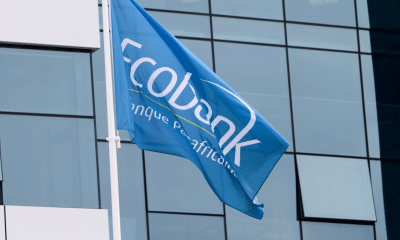Business
72 Billion Damages: Ecobank To Appeal High Court Judgement In Favour Of Honeywell

Ecobank Nigeria Limited has disclosed plans to appeal a Federal High Court judgment in Lagos, directing it to pay N72.2 billion to Honeywell Flour as damages.
Earlier, Naija News reported that Ecobank was ordered to pay N72.2 billion in damages to Honeywell Flour Mills Plc on Tuesday.
The directive was given by Justice Liman of the Federal High Court in Lagos.
Honeywell Flour Mills is said to have filed a suit against ECOBANK in 2018. In the case FHC/L/CS/1554/2018, the company seeks legal redress for the losses incurred due to an ex-parte asset freezing order granted to Ecobank Nigeria in 2015
Ecobank was said to have sworn an oath to indemnify Honeywell Flour Mills if the ex-parte orders were deemed frivolous.
In his arguments, Counsel to Honeywell Flour Mills, Bode Olanipekun, SAN, argued that the Supreme Court’s determination that the ex-parte orders obtained by Ecobank were improper implies that the application was frivolous.
This led to Honeywell Flour Mills seeking damages for losses suffered. Throughout the proceedings, Olanipekun contended that Ecobank’s actions inflicted significant harm and financial losses on business operations.
While delivering judgment on the case yesterday, Justice Liman held that “The plaintiff’s right to the damages sought had crystallised, and the plaintiff had a right to maintain this action.”
The court judge added that “The argument of the defendant has no basis.”
However, this platform understands that Ecobank is set to appeal the judgment it described as ‘perverse and cannot stand the test of time.’
According to Western Post, the bank is confident that it can reverse the judgment at a higher court and is therefore going all out to challenge the verdict vigorously.
The platform revealed sources in the bank explained that the instant suit was an action filed in 2018 for the enforcement of the Bank’s Undertaking as to Damages which was filed in pursuance of its Winding Up Petition and the Ex-Parte Orders, which were granted in favour of the Bank.
The platform further noted that the bank said, “We challenged the action through a Notice of Preliminary Objection dated 16th October 2018 whereby we challenged the jurisdiction of the Federal High Court, as (among other reasons), the action did not fall within the provisions of Section 251 (d) of the Constitution, being that the subject matter of the suit was for the Claim of Damages arising out of an Ex-Parte Order, as opposed to a Banker-Customer relationship. Trial was concluded in this matter since 9th March 2021, and the parties adopted their final written addresses alongside our Notice of Preliminary objection on the 16th March 2022, the Court then adjourned the matter to 27th May, 2022 for judgment. While the court failed to deliver judgment on the said date, the registrar of the court promised to inform counsel whenever the judgement was ready.
“In the wake of the Supreme Court’s decision in the Bank’s favour, in Suit No. SC/CV/210/2021 which was delivered on 27th January 2023, the bank further filed a Motion on notice dated 9th March 2023 to dismiss the Suit on the grounds that same has become academic as a result of the judgment entered in favour of Ecobank wherein the Supreme Court held that Honeywell remained indebted to the Bank. The Court heard motion dated 9th March, 2023 and adjourned to 23th June 2023, for ruling on our two applications and also for delivery of judgment. The Court consequently delivered the said ruling/judgment today July 18 via a virtual proceeding at about 4pm. In its Judgment, the Court dismissed the two applications we filed, holding that it has jurisdiction to entertain the suit and also that the suit had not become academic.”
According to the bank, “In reaching its judgment, the Court ignored/refused (among others): Submissions showing that the Ex-Parte Orders were discharged on points of law and not that it was frivolously obtained by the Bank; that the Ex-Parte Order lasted for less than 2 weeks, contrary to the Claim of Honeywell which was said to have covered the period of three years; that the documents presented by Honeywell particularly the annual returns did not show the alleged damage, hence same was indeed non-existent; that documents from various other Banks who were served with the ex-parte order showed that the Honeywell companies were indeed highly indebted to them. Hence there was no way the Ex-Parte Orders would have frozen funds in the said Banks; and more importantly, the Court refused all the objections regarding the documents maliciously prepared by Honeywell for the sole purpose of instituting the Suit and claiming unjustifiable sums from the Bank.”












